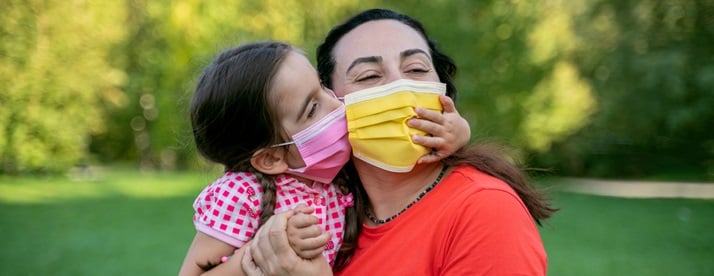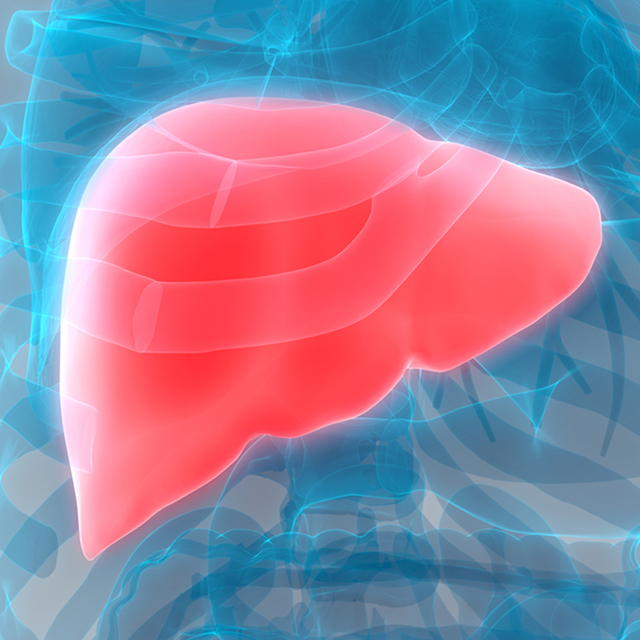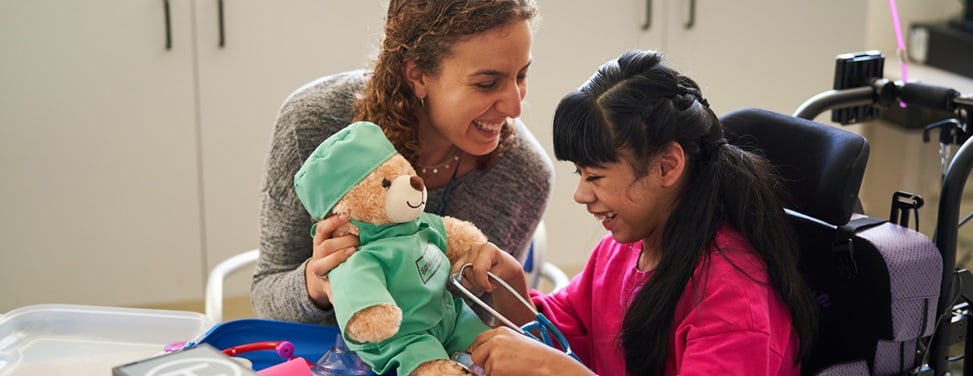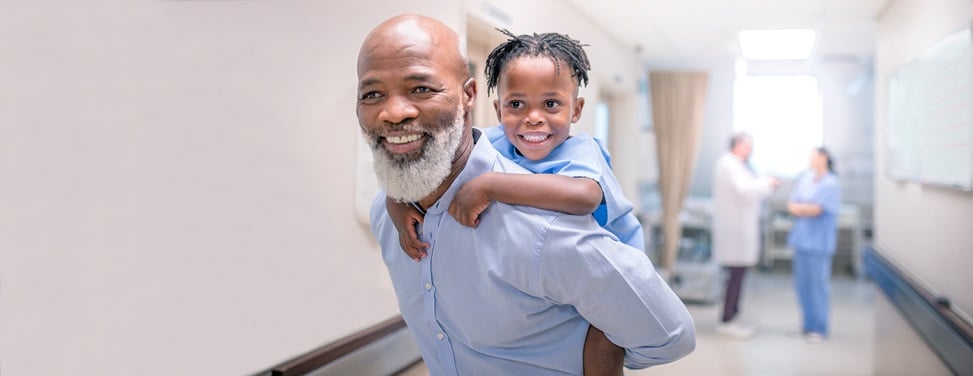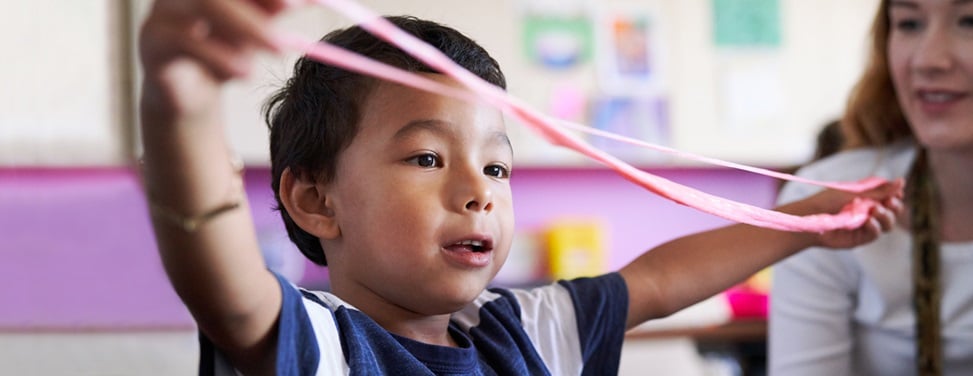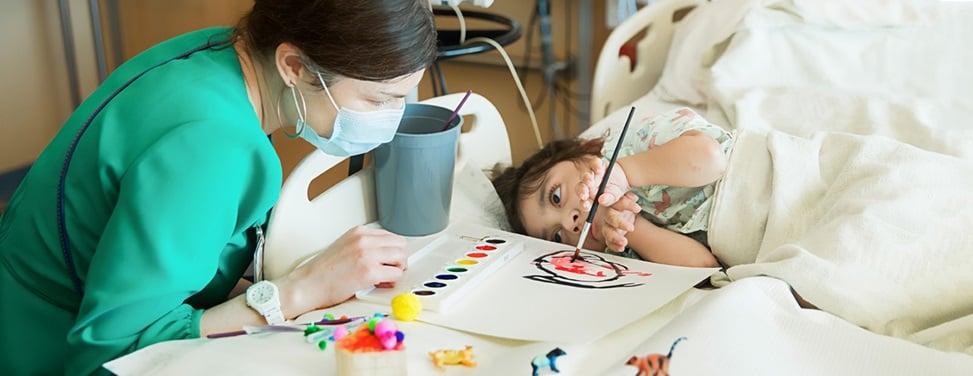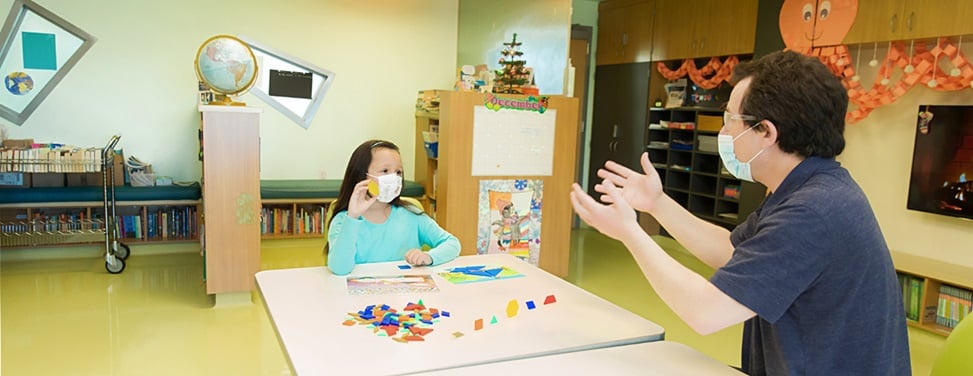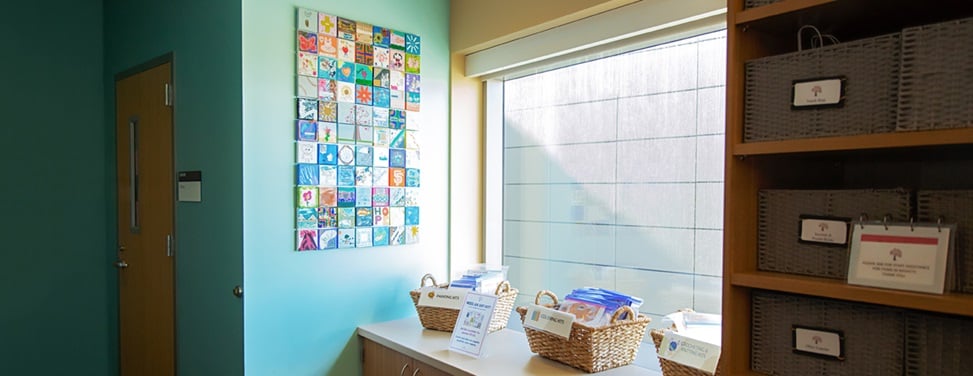
Liver Tumor & Hepatoblastoma Clinic
The Pediatric Liver Tumor and Hepatoblastoma Clinic cares for infants, children and teens with liver or bile duct tumors. Our specialists diagnose and treat all types of pediatric liver cancer, including hepatoblastoma, childhood hepatocellular carcinoma, childhood undifferentiated embryonal sarcoma of the liver, and infantile choriocarcinoma of the liver. Because liver cancer is rare in children, each patient needs individualized care from experts. UCSF's international liver tumor board meets monthly to discuss challenging cases and optimize treatment strategies.
Our care team includes renowned pediatric specialists in cancer, surgery, gastroenterology, radiology, interventional radiology, medical genetics and pathology, as well as providers with expertise in specific types of pediatric liver cancer. In a setting thoughtfully designed to make kids and families feel comfortable, these doctors work closely together to ensure your child receives the best possible care.
What's more, we have the most advanced techniques available for diagnosing and treating children with liver or bile duct tumors. Imaging and genetic testing provide information about the specific tumor, which helps us to customize treatment plans. Our approach to your child's care may include conventional surgery, minimally invasive procedures, chemotherapy, and therapies that can target the specific molecular makeup of the tumor. When a liver transplant is necessary, we work with our Pediatric Liver Transplant Program, a national leader in transplantation that has made the process safer and more successful.
Throughout your child's time with us – from evaluation and diagnosis to treatment and follow-up – our social work and child life teams will be there for your family. These specialists provide information, connect you with resources and offer emotional support.
To make life easier during this challenging time, we offer video appointments in addition to in-person visits.
Our locations (1)
Our team
-

Kate Cheng
MD
-

Soo-Jin Cho
MD, PhD
Anatomic Pathology, Pediatric Clinical Pathology -

Nicholas Fidelman
MD
Interventional Radiology -

Sang-Mo Kang
MD
Kidney Transplant Surgery, Liver Transplant Surgery -

Sarah L. Maxwell
MD
Pediatric Gastroenterology, Pediatric Hepatology -

Amar Nijagal
MD
General Surgery -

Emily R. Perito
MD, MA
Pediatric Gastroenterology, Hepatology -

Arun Rangaswami
MD
Pediatric Hematology, Pediatric Hematology Oncology -

Sue Rhee
MD
Pediatric Gastroenterology -

Alejandro Sweet-Cordero
MD
Hematology, Medical Oncology -

Lisa Gallagher
NP, MSN
Awards & recognition
-

Ranked among the nation's best in 11 specialties
-
Top 10 in the nation for gastroenterology & GI surgery
-

Top 10 in the nation and best in Northern California for cancer care
Plan your visit
What to Bring
- Photo I.D.
- Health insurance card
- Insurance authorization, if required
- Doctor's referral, if required
- Recent test results related to your child's condition
- List of medications, including dosages, plus any your child is allergic to
- List of questions you may have
- Device or paper for taking notes
Our research initiatives
Support services
Clinical trials
Thoracotomy Versus Thoracoscopic Management of Pulmonary Metastases in Patients With Osteosarco...
Estimated four year thoracic event free survival (tEFS) where tEFS is calculated as the time from study enrollment. Any recurrence within the pulmonary parenchyma, involving the pleural surface or the drain/surgical site wound wil...
Recruiting
More about this studyProject: Every Child for Younger Patients With Cancer
The number of patients who agree to be in the Biobanking part of the study and have leftover tumor tissue and some normal blood, bone marrow, or other tissue saved for future research.
Recruiting
More about this studyTargeted Therapy Directed by Genetic Testing in Treating Patients With Locally Advanced or Adva...
Will be estimated over time and considered in relationship to changes in treatment trial cohort status (activations, suspensions, terminations).
Recruiting
More about this studyChemotherapy for the Treatment of Patients With Newly Diagnosed Very Low-Risk and Low Risk Fusi...
The Kaplan-Meier method will be used to estimate 3-year FFS along with 80% log-minus-log transformed confidence limits for very low risk (VLR) patients.
Recruiting
More about this studyA Study to Test the Addition of the Drug Cabozantinib to Chemotherapy in Patients With Newly Di...
Only patients with high risk osteosarcoma who have a primary tumor considered resectable at the time of enrollment will be enrolled to this part of the trial. If a feasible dose cannot be established, the study committee will cons...
Recruiting
More about this studyDinutuximab With Chemotherapy, Surgery and Stem Cell Transplantation for the Treatment of Child...
EFS time is calculated from time of randomization to Arms A or B to first episode of disease relapse or progression, second malignancy, or death, or until last contact if no event has occurred.
Recruiting
More about this studyET140203 T Cells in Pediatric Subjects With Hepatoblastoma, HCN-NOS, or Hepatocellular Carcinom...
Safety of ET140203 T cells as assessed by the number of adverse events (AEs) after infusion
Recruiting
More about this studyCheckpoint Inhibition In Pediatric Hepatocellular Carcinoma
irRECIST criteria
Recruiting
More about this studyFood Insecurity and MASLD: A Fruit and Vegetable Intervention Study
What percentage of money of the vouchers were used monthly
Recruiting
More about this studyA Study of Combination Chemotherapy for Patients With Newly Diagnosed DAWT and Relapsed FHWT
Kaplan-Meier method will be used to estimate EFS, defined as the time from study entry until relapse or disease progression, secondary malignancy, or death.
Recruiting
More about this studyTranslation, please
We have interpreters for Cantonese, Mandarin, Spanish, Russian, American Sign Language and more.
Request an interpreter






























